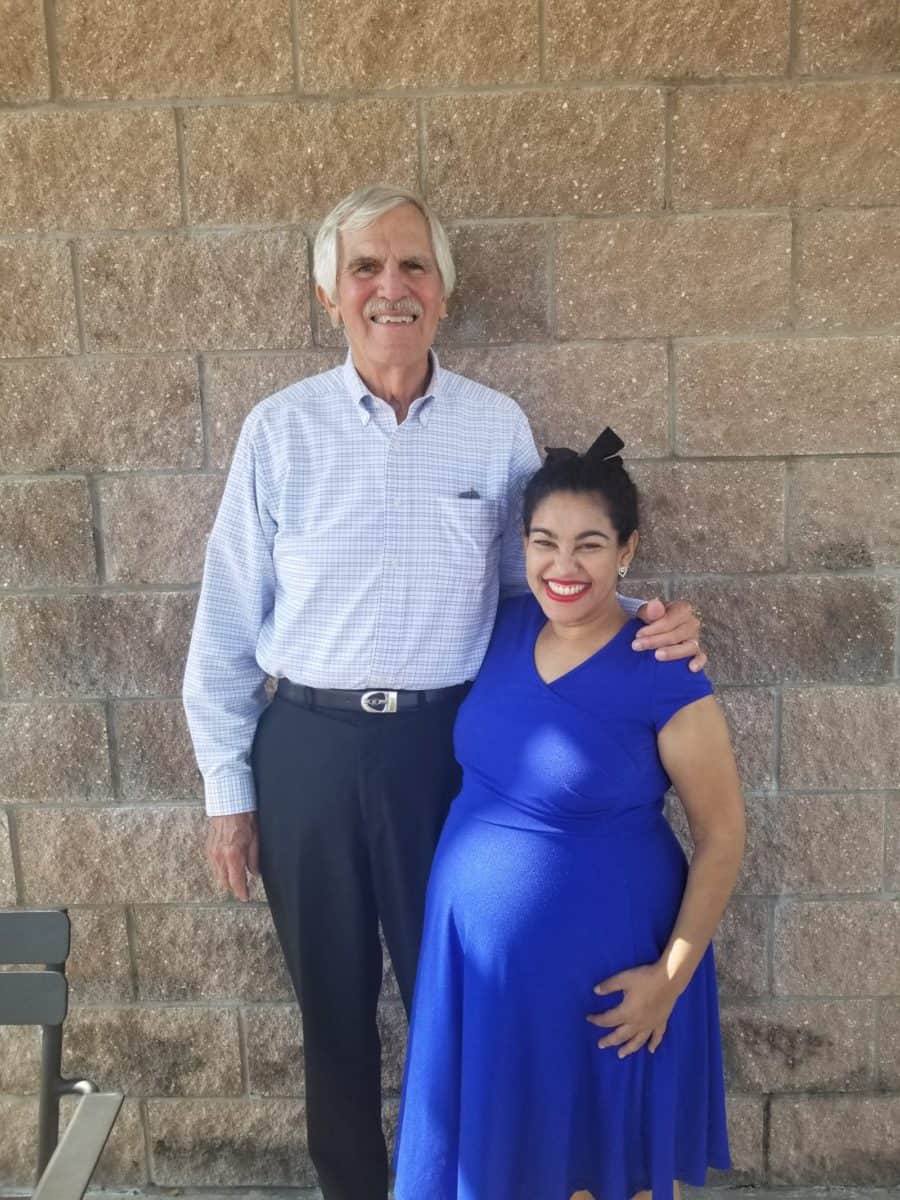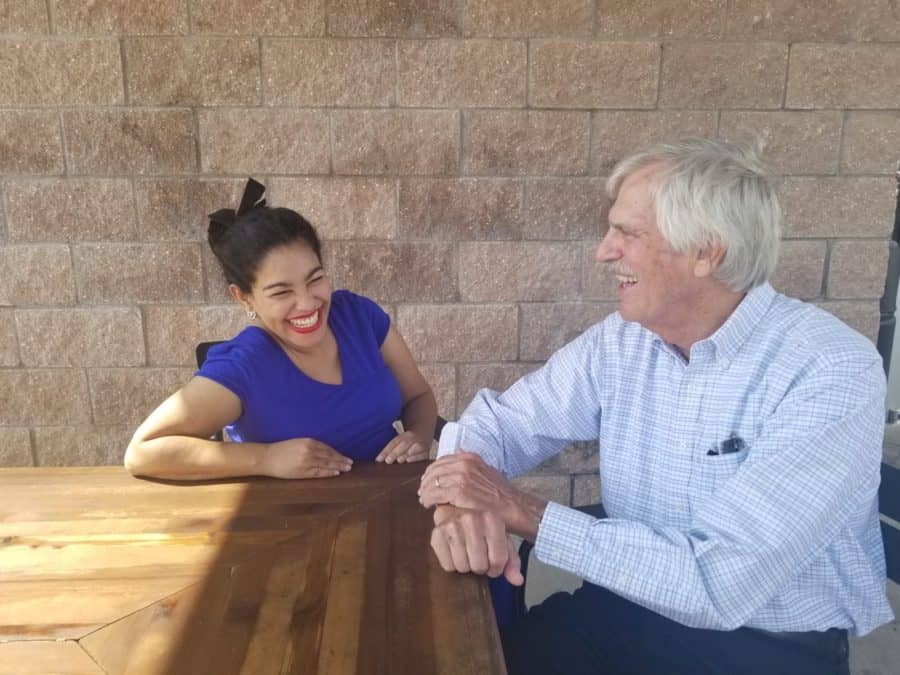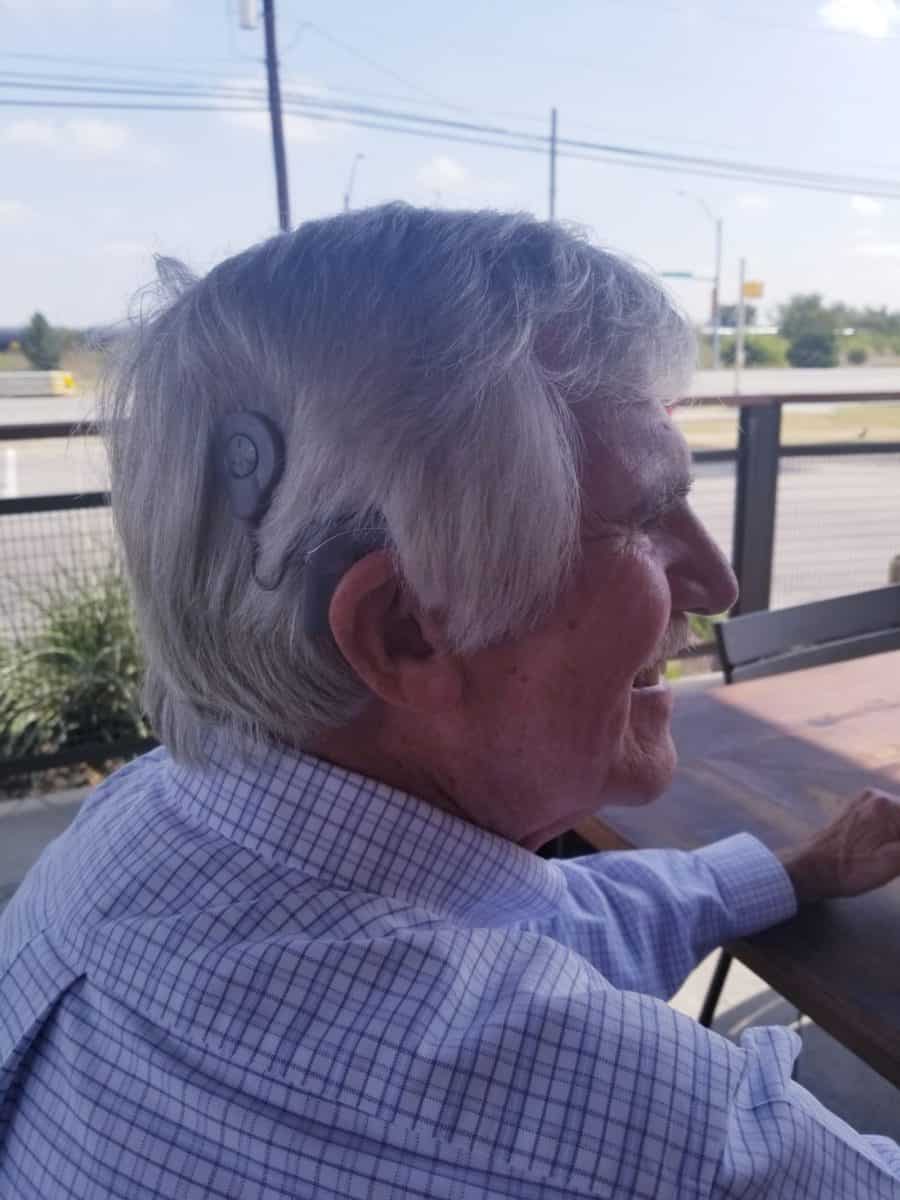![]()
Even though I’ve been through so much heartache and pain throughout my life, and it all seemed unbearable at the time, I really feel like the past few months have been the hardest of my life.
Ironically, and as usual, there were so many joys amidst the chaos and the complications, some of them we usually take for granted.
I reflected on this when my newborn baby passed her hearing test. Just as I was handed a certificate guaranteeing that her hearing was perfection, I felt the familiar “survivor guilt,” as I thought about those parents whose babies didn’t get such assurance. I also thought about people of all ages who can’t hear like I do and about my dream of being a connected grandmother, when the time comes.

I had met with Kent just a week before all the birthing madness, and the experiences he shared with me were fresh on my mind.
According to the National Institutes of Health (NIH), one in every three people 65 years of age and one in every two people 75 years of age and over has hearing loss.
Although Kent is 78 years old, he started using hearing aids at age 35, in 1976. He went into the armed forces with perfect hearing, but they didn’t provide any safety devices at that time. The Army told him his hearing loss was an occupational hazard when he was in the service in the late 1950’s and mid-60’s.
On average, research from John Hopkins Medicine finds, people who struggle with hearing loss wait 10 years before seeking treatment, even though it impacts how they communicate and connect with the world, and most importantly, with their loved ones.
I cannot even imagine a day struggling to communicate with the people I love, not fully participating in my work and my passions, and unable to have a fulfilling social life. 10 years seems like torture!
Connection is one of my highest core values and, as I age, I am being more intentional in finding out how to make sure I am fully involved in my children’s and, hopefully, my future grandchildren’s lives. I want to be able to relate to them and not let our relationship or the dynamics of my family life deteriorate along with my health or my hearing.

As I sat with Kent and he shared his powerful hearing loss journey with me, I was in awe at how courageous he was to take every necessary action to help himself hear better and how these decisions have improved his quality of life – in every way.
I was quite familiar with hearing aids and I was fascinated to hear how many brands and types Kent tried. Hearing aids are the first step to treating hearing loss, however, if hearing aids are not providing enough benefit, it might be time to consider a cochlear implant: an FDA-approved, surgically implanted medical device that mimics the function of the inner ear (cochlea) and is designed to mimic natural hearing.
My meet-up with Kent was arranged by Cochlear Americas. Kent is so happy with the “exceptional product, exceptional results,” that he volunteers his time to share his story with others.
Cochlear is the global leader in implantable hearing solutions. Cochlear implants are the only proven medical treatment option for those with severe to profound hearing loss in both ears. A cochlear implant is designed to provide clearer sound, so you can understand what is being said, especially in noisy environments.
93% of cochlear implant recipients improved speech understanding compared to hearing aids1. 83% report a statistically significant improvement in quality of life after receiving a cochlear implant (1).
Before the implant, Kent was disengaging from conversations because he couldn’t hear enough to be an active participant in them. This was especially hard while talking on the phone, in the car, a plane, a room full of people, or any other loud environments. He hated when the whole room would start laughing and he had missed it.
You become alone. The stress and anxiety kick in.
I’m grateful for Kent’s honesty about his hearing loss. Many people feel like their world falls apart when they finally accept they have hearing loss. Most are terrified and feel lonely (because they may be surrounded by people but feel isolated), frustrated, embarrassed, and overwhelmed.
Kent is such a wise and kind man. As we discussed how grateful he was to regain his ability to get back to the sounds he had been missing, I started to feel more grateful for my ability to hear and more determined to do what it takes to keep it as well as make sure I have the resources to help my aging family members.
When I think of loss, I think of grief and all its stages (anger, denial, bargaining, depression, and acceptance). This grieving process is something everyone experiences, because living with untreated hearing loss or deafness impacts everyone in the family.
Family members of someone who is experiencing hearing loss can learn to adapt to the situation. Communicating with someone who struggles with hearing can be a demanding task; it requires more patience, and little things like repeating yourself or turning the subtitles on can seem annoying or frustrating, but they make a difference to the person struggling.
Kent kept telling me how grateful he was for his wife – the person he most wants to hear. She actually dropped her voice a whole octave for him to hear her better. They were 23 and 20 when they made their wedding vows, and he appreciates how they have stuck together “in sickness and in health,” even though it has a whole different meaning now.
The last thing a deaf person wants to hear is ‘Oh nevermind.’
If it was good enough to say, they want to hear it!
Kent is now re-engaging with the people in his life, and is sharing how the experience has helped him release both physical and emotional stress. He knew his life was changing without hearing, and receiving a cochlear implant helped reverse it. He is happy to see the reaction on friends and relatives when they notice he hears and communicates better!
We chatted about how hearing loss prevents you from participating in precious conversations and fully communicate with family and friends, talk on the phone, listen to music you appreciate, watch and hear the TV, and so much more.
The TV volume has come down from 72 to 35. I am hearing sounds that I love and have not heard in over 40 years, like bird calls, crickets, cicadas, the high notes of the violin and piano, the herd of piccolos stampeding into “Stars and Stripes Forever”; not unsatisfying sounds like outdoor lawn equipment, refrigerator motor, heating and air conditioning system, and other noises I could live without. Sometimes when I take off my sound processor: “Silence is golden”…. at least for a little while. I surely don’t want to go back to my hearing before the cochlear implant.
We are so blessed to enjoy the sounds of everyday life. I’m grateful for so many sounds I get to hear: the sound of rain falling, happy laughter, my own heartbeat, my cat’s “meow,” the pages of a book as I turn them, the tick tock of clocks, the songs of birds chirping, the wind howling, the splash of sea waves, the clickety click of technology as I use it to impact others, the tap, tap, tap of little footsteps around the house, my breath, songs that help me heal, the fizz of sparkling water, the doorbell when a package is being delivered, my loved ones’ voices, and, naturally, a newborn baby’s cry.

I was able to get 3 lessons, or steps, if you will, that Kent has used to keep positive, happy, and connected on his hearing loss journey:
- Do the right things to recover
- Be gentle with yourself
- Ask others to repeat, don’t beat yourself up
Kent has done what he feels are the right things for his health and that’s why he’s bringing awareness about how cochlear implants are the only proven medical treatment for adults with severe to profound hearing loss. He feels blessed that his audiologist recommended cochlear implants to him in the Summer of 2017, because his hearing was consistently declining.
He immediately considered the cochlear implant, because he felt his audiologist had his best interests at heart. He had no fear related to the cochlear implant, but he wanted to know about the procedure and what was entailed, which led him to attend a presentation to get the answers he needed to feel comfortable with moving forward.
The procedure took about 1 ½ hours on December 11, 2017, and in just 4 hours he was on his way home. Kent’s cochlear implant sound processor was activated later on. There was no recovery time for him, and little or no pain, and the cochlear implant worked (meaning: he could hear) from his activation day, on day one, too! He worked with his audiologist to adjust everything so he could hear better.
Kent says his hearing is 90% normal. It seemed to me about 100% since we had a 2-hour chat and he didn’t miss a beat. He jokingly attributed the 10% to conversations with his daughter, because “she speaks in fast-forward.”
An interesting fact I learned from Kent about cochlear implants that I never would have guessed:
Hearing aids make what you can hear louder, cochlear implants are designed to provide clearer sound to help you understand what is being said.
I was fascinated hearing Kent speak about how his brain is being re-trained by the cochlear implant and it was inspiring to see the spark in his eyes when he told me he finally started learning to hear again at 76 years old, after having hearing difficulties for 40 years.
Music, especially music with voices, are the most difficult for my brain to be retrained to hear.
Kent is a visual artist and a singer. He’s been part of a choir and singing for 32 years. Since he learns music by hearing, not by reading the notes, and loves listening to others’ voices, you can imagine what a joyful experience it is for him to appreciate music now.
As I age, I am excited there are options that will allow me to hear clearly, so I don’t miss out on meaningful moments and cherished conversations with those I love.
If your parent, grandparent, spouse – or anyone you love – is aging and showing signs of hearing loss or lives with untreated hearing loss, there are solutions and help is available now.
I encourage you to visit the “Unstoppable” site to learn more about cochlear implants and other implantable hearing solutions that could help you or your loved ones hear again and reconnect fully to life and love.
Deciding on an implantable hearing solution is the personal choice of any individual or family. I respect that every individual makes the choice that is right for them.
What sounds do you love that many would take for granted? Share with us in the comments below!
Please seek advice from your health professional about treatments for hearing loss.
Outcomes may vary, and your health professional will advise you about the factors which could affect your outcome. Always read the instructions for use. Not all products are available in all countries. Please contact your local Cochlear representative for product information. Views expressed are those of the individual. Consult your health professional to determine if you are a candidate for Cochlear technology.
1Clinical Evaluation of the Cochlear Nucleus CI532 Cochlear Implants in Adults Investigator Meeting. 2019 Apr.
[ela]

Kristine Nicole Alessandra
Monday 23rd of December 2019
I always love the sound of my little grandson's voice when he calls me "Mama." It would be so sad for me to not be able to hear him call me. I am glad though that there are so much advances in medical science to help with hearing loss.
Krista
Tuesday 17th of December 2019
The desire for human connection is the strongest we have. This is clearly so evident in your post. I love that, after just having a newborn, you are already dreaming of being a connected grandparent. I’m sorry these last few months have been so tough on you; I hope 2020 brings you bliss with your perfect new baby to love.
Lara | Grits in the City
Sunday 15th of December 2019
My grandmother battled hearing loss and it’s so hard. It’s amazing what technology can do now to help improve this for people.
Myrah Duque
Saturday 14th of December 2019
My grandmother wore hearing aids. I remember when I was in middle school, asking her a question and not getting a response. It's sad but thanks to technology people are able to improve their lives and those around them.
Lashunta
Saturday 14th of December 2019
I don’t know much about these ear implants but I do have a friend whose infant has recently had multiple hearing tests and will be getting a hearing aid. I am going to share this article with her. I am so grateful for the medical advancements we have.